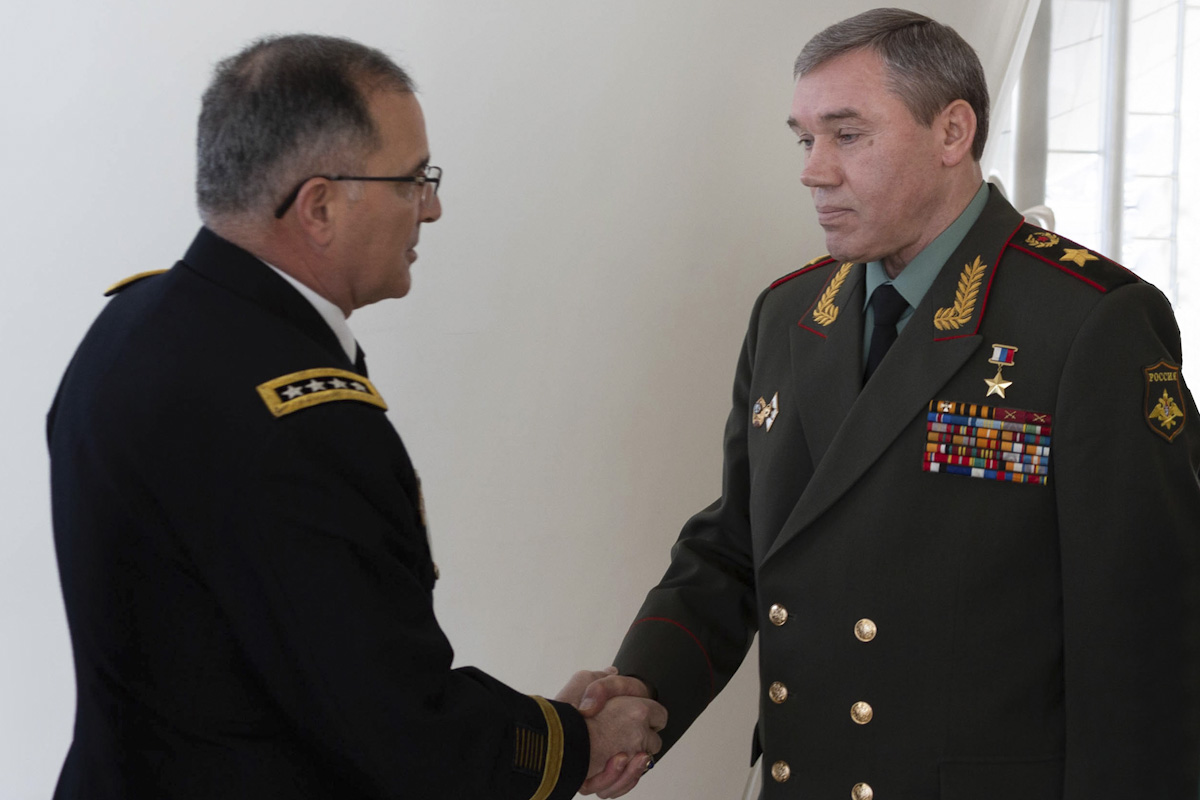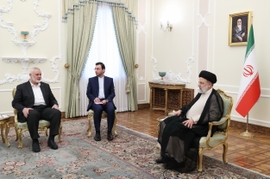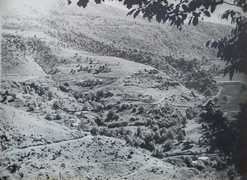The top military officers from Russia and NATO met in Azerbaijan’s capital city on Wednesday for talks about defense issues, including NATO’s recent reinforcement of forces and activities near Russia’s western borders.
General Valery Gerasimov, Chief of the General Staff of the Armed Forces of the Russian Federation and First Deputy Minister of Defense, and General Curtis Scaparrotti, NATO’s Supreme Allied Commander in Europe, reportedly discussed regional and global security during their meeting in Baku, according to Russia’s Defense Ministry.
“Valery Gerasimov noted the strengthening of the advanced NATO military presence near the borders of Russia, which does not contribute to reducing tensions,” read a statement issued by the ministry on December 12. “The parties informed each other about the most important operational training activities planned in 2019. Confirmed interest in maintaining contacts.”
According to a read-out posted to NATO’s website, General Scaparrotti highlighted the priority that NATO attaches to transparency and predictability of military activities.
Amidst the souring NATO-Russia relations, Gerasimov and Scaparrotti met for what was their second face-to-face meeting. They had last met in April, and talked by telephone in September.
“Azerbaijan, being a worthy and responsible member of the international community, by hosting meetings in this format, contributes to strengthening of global peace, security and arms control, reducing tensions at the international level and forming strategic dialogue, as well as atmosphere of mutual trust,” the head of the Foreign Policy Affairs Department of the Azerbaijani Presidential Administration, Hikmet Hajiyev, said while commenting on the meeting, Azertac reported.
“Choosing Azerbaijan among many countries to discuss important issues related to global security is a manifestation of respect and trust in Azerbaijan, an indicator of its role in ensuring regional security, development and stability,” Hajiyev said, noting that hosting such high-level meetings is not a first for the Caspian country that was once a Soviet republic but has, in recent decades, become a reliable and trusted partner of NATO.
In February 2017, the U.S. Chairman of the Joint Chiefs of Staff and the Russian Chief of the General Staff met in Baku. In September of that year the chairman of the NATO Military Committee met with the Chief of the General Staff of the Russian Armed Forces.
NATO has worked to build a partnership with Russia for more than two decades through a dialogue and a practical cooperation in the areas of common interest. However, bilateral relations spiraled down after what NATO claimed to be Russia’s military intervention and annexation of Crimea in Ukraine in 2014. The Western military block is concerned about what it considers to be Russia’s destabilizing behavior in Eastern Europe, believing that Moscow’s aggressive actions could go beyond Ukraine.
On December 4, NATO allies unanimously blamed Russia for developing and fielding a new missile system, saying it breaches the Intermediate-Range Nuclear Forces Treaty – a key arms control agreement which has been crucial in upholding NATO’s security for over 30 years. Foreign ministers from NATO member states called on Russia to immediately step back to full and verifiable compliance of the treaty.
Russia’s counter-accusations against NATO have recently been voiced by Defense Minister Sergei Shoigu in a newspaper interview published in July, in which he criticized the United States and the U.S.-led military bloc for relocating allied forces and bases close to the Russian border. Shoigu referred to the U.S. missile defense shield in Eastern Europe, also called the European Interceptor Site, which Washington says exists for protection against possible attacks by Iran. Parts of that system are located near Russia’s exclave of Kaliningrad along the Baltic coastline in northeastern Europe.
As a result of its historic ties to Russia and its current relationship with NATO, Azerbaijan has maintained good relations with both. As a successor to the Soviet Union, Russia continues to be one of Azerbaijan’s regional partners and a main arms supplier. At the same time, Azerbaijan supports various NATO peacekeeping missions, including operations in Afghanistan. A contingent of 120 servicemen currently serve with allied forces in the Afghan capital city of Kabul.







 Iran's senior military leaders described the drone and missile attack on Israel on April 14 night as “successful".
Iran's senior military leaders described the drone and missile attack on Israel on April 14 night as “successful".
 The Islamic holy month of fasting, Ramadan comes to an end this week with the celebration of a joyous festival called Eid (meaning “festival” in Ar...
The Islamic holy month of fasting, Ramadan comes to an end this week with the celebration of a joyous festival called Eid (meaning “festival” in Ar...
 Iran's President Ebrahim Raisi extended condolences to the Chairman of the Political Bureau of the Palestinian Hamas group, Ismail Haniyeh, followi...
Iran's President Ebrahim Raisi extended condolences to the Chairman of the Political Bureau of the Palestinian Hamas group, Ismail Haniyeh, followi...



